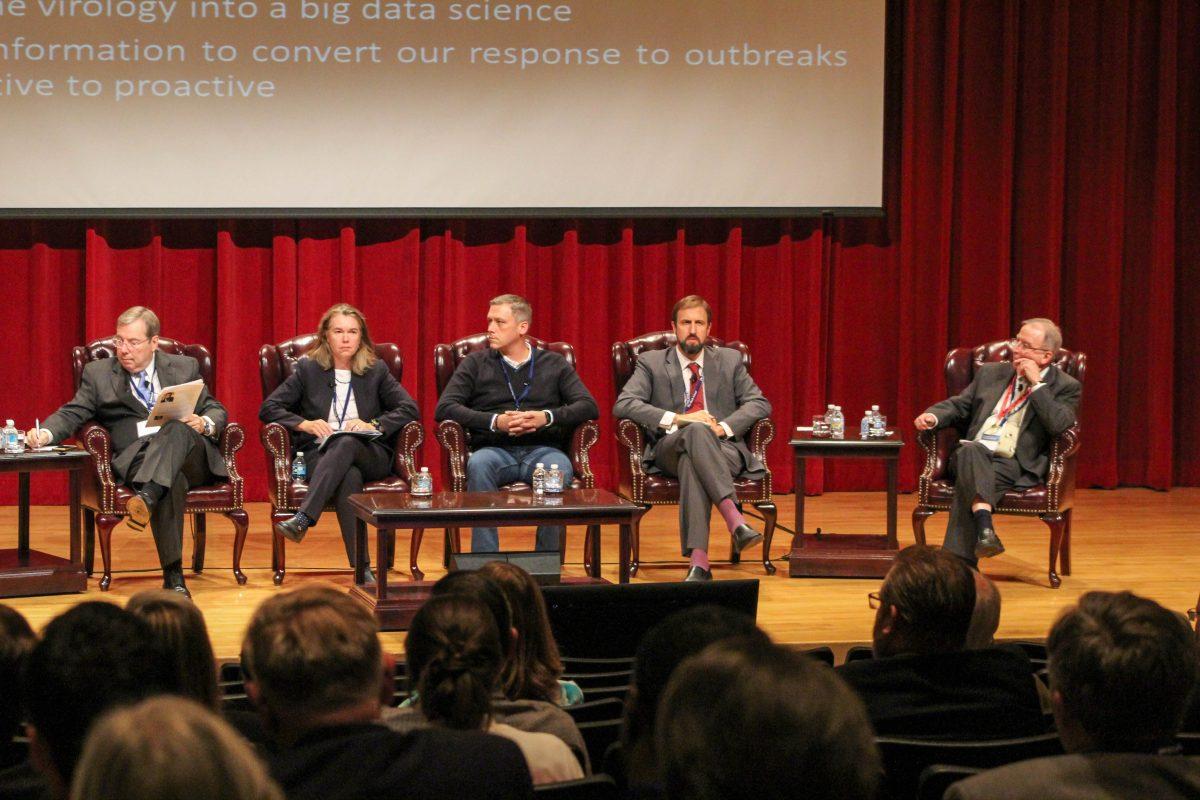As the 100th year anniversary of the 1918 flu epidemic approaches, the Scowcroft Institute of International Affairs at the Bush School hosted a forum to discuss the importance of creating a collaborative community to prepare and respond to pandemics.
Professors, public servants and private sector representatives gathered at The Pandemic Preparedness and Global Health Innovation Forum Tuesday afternoon, which included presentations detailing innovative ways to respond to disease outbreaks. Panelists included Baylor College of Medicine Professor Dr. Peter Hotez and Dennis Carroll, Director of Global Health for the U.S. Agency for International Development.
Michael Osterholm presented his book titled “Deadliest Enemy and our Flight Against the Microbe” prior to the forum. As the current Director for the Center for Infectious DIsease Research and Policy, Osterholm said that although experts are more concerned about pandemic influenza, the flu virus has the potential to evolve into seasonal flu strains eventually affecting those with flu vaccines.
“We have a terribly inadequate flu vaccine and supply problem,” Osterholm said. “The vaccine is never going to be sufficient and if we were to have another pandemic, even if you had the vaccine you would still get a flu, really an even stronger version of it.”
According to the CDC, the 2009 influenza A virus caused the first global pandemic in more than 40 years. Because the flu vaccine is produced by private manufacturers, Gerald Parker Ph.D., Associate Dean of Global One Health at the College of Veterinary Medicine said the availability and access to flu vaccines plays a significant role in our response to global pandemics.
“We need the private sector involved in pandemic preparedness,” Parker said. “The government also has a responsibility in providing guidance, policy and the resources that are necessary, so that there is capacity to surge in the event of a pandemic.”
Parker, former Deputy Assistant Secretary of Defense for the Department of Health and Human Services, said that policy plays a significant role in our response to disease outbreaks.
“We would like to detect an outbreak rapidly so we can prevent it from becoming a pandemic,” Parker said. “There is relatively new policy that was initially lead by the U.S, but now it’s becoming a global effort called the Global Health Security Agenda.”
Global Health Security Agenda was launched in February 2014 with a mission to collaboratively prepare, prevent, and respond to global pandemics around the world. Partnering with over 50 nations and other non-governmental stakeholders around the world, Parker said students can also play a significant role in preventing pandemics.
“For those students who are interested in global health, I’d recommend joining the Global Health Security Next Generation,” Parker said. “You have the opportunity to get connected to like minded students and faculty around the world and work together to find a solution to these problems.”
Christine Blackburn is a postdoctoral research fellow at the Scowcroft Institute. With their mission to foster and share policy-oriented information on international affairs, Blackburn said the Scowcroft institute’s goal with this forum is to bring experts together to find solutions to global pandemics.
“We are absolutely not ready for another flu epidemic like the one in 1918,” Blackburn said. “Of course we have a lot of people working extremely hard to prepare, but we still have a long way to go. We need to be thinking about the things before it happens, and not after.”
Experts discuss Pandemic Preparedness
October 17, 2017
Photo by Photo by Madeline Sambrano
Experts spoke about preparedness and response to pandemics at Scowcroft Institute of International Affairs at the Bush School on Oct. 17.
0
Donate to The Battalion
Your donation will support the student journalists of Texas A&M University - College Station. Your contribution will allow us to purchase equipment and cover our annual website hosting costs.
More to Discover









